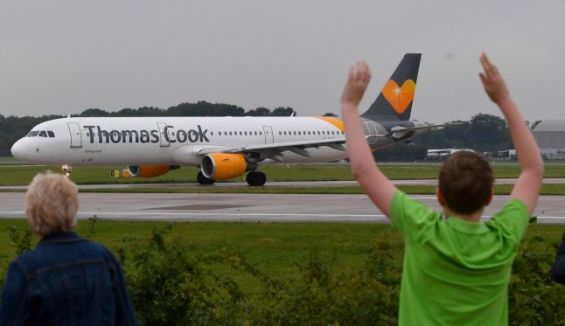British global travel group Thomas Cook announced, Monday, that it has ceased trading, putting an end to all its operations around the world, including the one delivered by its Manchester-based charter airlines.
The news came as a bombshell for the 150,000 British holidaymakers stranded abroad, BBC reports. «[the collapse] is a matter of profound regret», said Peter Frankhauser, Thomas Cook’s chief executive, after the travel firm failed to save itself from bankruptcy.
Formerly listed on both the London Stock Exchange and the Frankfurt Stock Exchange, the 178-year-old firm’s collapse puts «22,000 jobs at risk worldwide, including 9,000 in the United Kingdom», wrote BBC.
The crisis is even bigger for British tourists who have booked flights home with Thomas Cook. On its website, the tour operator announced that «all holidays and flights provided by [its] companies have been cancelled and are no longer operating», adding that «all Thomas Cook’s retail shops have also closed».
Customers stranded abroad and in Morocco
To help its customers stranded abroad, the firm said in the same communiqué that the British «government and the Civil Aviation Authority are now working to support passengers due to fly back to the UK with Thomas Cook between 23 September 2019 and 6 October 2019».
In a press notice sent Monday to Yabiladi by the British Embassy in Rabat, it was reported that, indeed, the «UK Civil Aviation Authority (CAA) has hired dozens of charter planes to fly customers home free of charge».
«All customers currently abroad with Thomas Cook who are booked to return to the UK over the next two weeks will be brought home as close as possible to their booked return date», the same source said.
This operation will also include Thomas Cook’s customers stuck in Morocco, considered as one of the firm’s top travel destinations.
Yabiladi learnt that Thomas Cook’s customers in Morocco will be able to «fly back home as initially scheduled» by the firm, which operates two flights a week linking Manchester to Marrakech. This operation will be carried via «replacement flights, arranged by the UK Civil Aviation Authority» well-informed sources told Yabiladi.
Later that day, a source from the Ministry of Tourism told the Spanish news agency EFE that around 2,000 Thomas Cook customers are currently stranded in the Kingdom and that all of them are British.
The same source revealed that most of these tourists who booked with the travel firm are holidaying in two Moroccan cities. «1,300 of them are in Agadir while 650 others are in Marrakech», the same source told EFE.
Thomas Cook's big Morocco ambitions
Indeed, Thomas Cook’s customers in Morocco are being affected by its sudden collapse, the firm was seeing Morocco as one of its top destinations in North Africa and in the world.
In July, Thomas Cook said that it launched a new Morocco route, linking Marrakech to the Gatwick airport in London, and packages. It announced that its new offer includes «twice-weekly flights, flying Tuesdays and Fridays» to Marrakech. The latter was expected to start operating from November 2019 to April 2020.
As part of its North Africa destinations, Morocco has recently been a priority for the travel firm. On September 10, Will Waggott, chief of tour operating at Thomas Cook UK, said that «Turkey and North Africa are destinations we’re falling back in love with». He had even explained that Thomas Cook expects «these countries to continue to appeal to families well into next year and beyond».
Thomas Cook had even had bigger hopes for Morocco as a destination. In 2017, the British global travel company announced a partnership with the Moroccan National Tourist Office (ONMT) during the World Travel Market, held in London.
At the time Thomas Cook promised to increase its influx of British tourists to Morocco from 70,000 to 400,000 over the next three years. «Our ambition is to reach the threshold of 1 million British tourists over the next two years», said Abderrafie Zouiten, president of ONMT.
However, these ambitions will definitely be affected by Thomas Cook’s collapse.




 chargement...
chargement...












